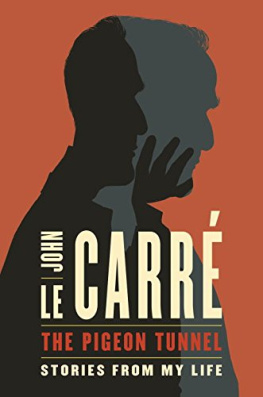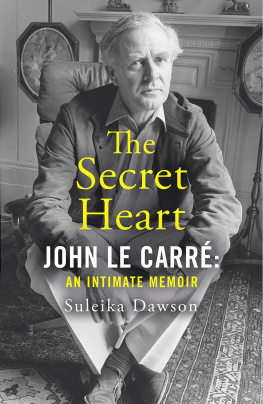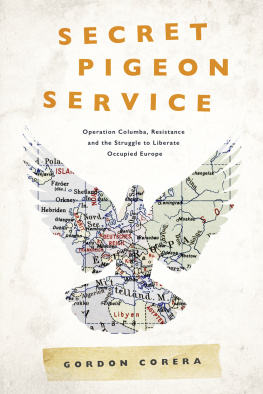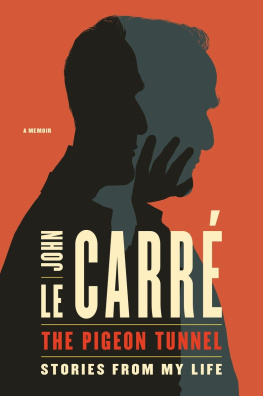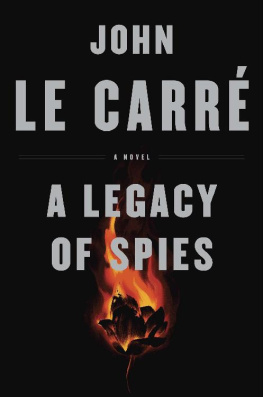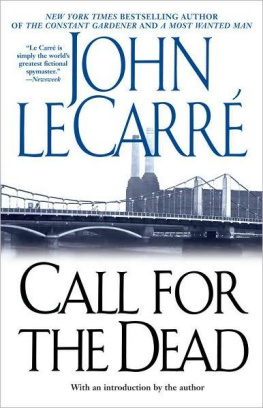There is scarcely a book of mine that didnt have The Pigeon Tunnel at some time or another as its working title. Its origin is easily explained. I was in my mid-teens when my father decided to take me on one of his gambling sprees to Monte Carlo. Close by the old casino stood the sporting club, and at its base lay a stretch of lawn and a shooting range looking out to sea. Under the lawn ran small, parallel tunnels that emerged in a row at the seas edge. Into them were inserted live pigeons that had been hatched and trapped on the casino roof. Their job was to flutter their way along the pitch-dark tunnel until they emerged in the Mediterranean sky as targets for well-lunched sporting gentlemen who were standing or lying in wait with their shotguns. Pigeons who were missed or merely winged then did what pigeons do. They returned to the place of their birth on the casino roof, where the same traps awaited them.
Quite why this image has haunted me for so long is something the reader is perhaps better able to judge than I am.
Introduction
I sit at my desk in the basement of the little Swiss chalet that I built with the profits from The Spy Who Came in from the Cold in a mountain village ninety minutes by train from Bern, the city to which at the age of sixteen I had fled from my English public school and where I had enrolled at Bern University. At weekends a great bunch of us students, boys and girls, mostly Bernese, would flood up to the Oberland, bunk down in mountain huts and ski our hearts out. So far as I ever knew we were the soul of probity: boys one side, girls the other, never the twain shall meet. Or if they did, I was never one of them.
The chalet sits above the village. Through my window, if I take a steep look upwards, I can glimpse the peaks of the Eiger, Mnch and Jungfrau, and most beautiful of all, the Silberhorn and the Kleines Silberhorn half a step below it: two sweetly pointed cones of ice that periodically succumb to drabness in the warm south wind called the Fhn, only to reappear days later in all their bridal glory.
Among our patron saints we have the ubiquitous composer Mendelssohn follow the arrows for the Mendelssohn walk the poet Goethe, though he seems to have made it only as far as the waterfalls of the Lauterbrunnental, and the poet Byron, who made it as far as the Wengernalp and hated it, protesting that the sight of our storm-ravaged forests reminded me of myself and my family.
But the patron saint we most revere is undoubtedly one Ernst Gertsch, who brought fame and fortune to the village by inaugurating the Lauberhorn Ski Race in 1930, in which he himself won the slalom. I was once mad enough to take part in it and, by a combination of incompetence and naked fear, came the predictable cropper. My researches tell me that, not content to become the father of ski racing, Ernst went on to give us the steel edges to our skis and steel platforms for our bindings, for which we may all be thankful to him.
The month is May, so we get a whole years weather in one week: yesterday a couple of feet of fresh snow and not a single skier to enjoy it; today an unobstructed scorching sun, and the snow nearly gone again and the spring flowers back in business. And now this evening, thunderclouds of Paynes grey getting ready to march up the Lauterbrunnen valley like Napoleons Grande Arme.
And probably in their wake, and because for the last days we have been spared a visit, the Fhn will return and sky, meadows and forests will be drained of colour, and the chalet will creak and fidget, and the wood smoke will roll out of the fireplace on to the carpet we paid too much for on that rainy afternoon in Interlaken in the snowless winter of whenever it was, and every clank and honk coming up from the valley will ring out like a sullen call of protest, and all birds will be confined to their nests for the duration, except for the choughs who take orders from no one. In the Fhn, dont drive a car, dont propose marriage. If youve got a headache or an urge to kill your neighbour, be consoled. Its not a hangover, its the Fhn.
The chalet has a place in my eighty-four years of life that is quite disproportionate to its size. In the years before I built it, I came to this village as a boy, first to ski on skis of ash or hickory, using seal skins to climb uphill and leather bindings to come down again, then to walk the mountains in summer with my wise Oxford mentor, Vivian Green, later Rector of Lincoln College, who gave me by his example the inner life of George Smiley.
Its no coincidence that Smiley like Vivian loved his Swiss Alps, or like Vivian found his consolation in landscape, or like myself had a lifelong, unreconciled relationship with the German muse.
It was Vivian who put up with my maunderings about my wayward father, Ronnie; Vivian again who, when Ronnie made one of his more spectacular bankruptcies, found the necessary cash and hauled me back to complete my studies.
In Bern I had got to know the scion of the oldest family of hotel owners in the Oberland. Without his later influence I would never have been allowed to build the chalet in the first place, for then as now no foreigner may own so much as a square foot of village land.
It was also while I was in Bern that I took my first infant steps for British Intelligence, delivering I knew not what to I knew not whom. I spend a lot of odd moments these days wondering what my life would have looked like if I hadnt bolted from my public school, or if I had bolted in a different direction. It strikes me now that everything that happened later in life was the consequence of that one impulsive adolescent decision to get out of England by the fastest available route and embrace the German muse as a substitute mother.
I wasnt a failure at school, far from it: captain of things, winner of school prizes, potential golden boy. And it was a very discreet bolt. I didnt howl and scream. I just said, Father, you may do with me what you will, I wont go back. And very probably I blamed the school for my woes and England along with it when my real motive was to get out from under my father at all costs, which I could hardly say to him. Since then, of course, I have watched my own children do the same, though more elegantly and with a lot less fuss.

